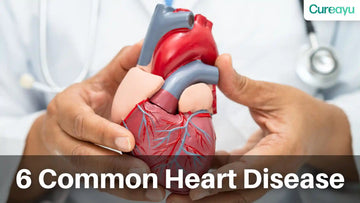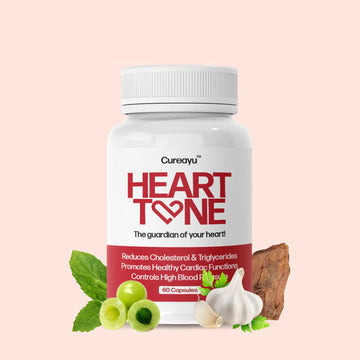What Is Heart Disease?
Heart disease is a serious global health concern, being one of the leading causes of death and affecting millions of people each year. Geographic Although a wide variety of conditions that can affect the heart are included, since they affect the function of the heart, they may cause serious consequences such as heart attack, stroke, and heart failure. Even though heart disease is a common condition, most cases can be prevented or managed with early interventions, lifestyle changes, and proper treatment.
The problem is that heart disease can creep up on you without obvious warning signs. Many don’t present symptoms until a significant event — like a heart attack — has taken place. This underscores the importance of considering key risk factors, including high blood pressure, high cholesterol and triglycerides, smoking, obesity, and diabetes. All of these can lead to gradual narrowing or a complete blockage of the arteries. This reduces blood flow to the heart, increasing the risk of fatal events.
Also Read: Exercise for Heart Health: Boost Your Cardiovascular Wellness with the Right Workouts
Major Causes of Heart Issues
There are multiple causes for the heart disease you might have. Common causes include things like:
-
High Blood Pressure (Hypertension) — The added pressure on the arteries makes the heart pump harder, which causes long-term harm.
-
Low Density Lipoprotein (LDL) or high cholesterol: Too much cholesterol in the blood can lead to plaque formation in the arteries, which can lead to the narrowing of arteries and reduced blood flow.
-
Diabetes: High and uncontrolled blood sugar levels may cause damage to blood vessels and increase the risk of heart disease.
-
Obesity: An excess body mass stresses the heart, and raises risks of hypertension and diabetes.
-
Smoking: Smoking hurts blood vessels and decreases oxygen supply, making it one of the leading risk factors for heart disease.
-
Sedentary Lifestyle: Lack of activity can lead to obesity, high blood pressure, and poor circulation.
-
Unhealthy Diet: A diet rich in trans fats, processed foods, and too much sodium can elevate cholesterol and the risk of cardiovascular disease.
-
Stress: Long-term stress can contribute to high blood pressure and to unhealthy coping behaviors like overeating or smoking.
-
Genetics: The risk of heart disease is greater in people whose family members have had cardiac issues.
Types of Heart Disease
Heart Arrhythmias
Heart arrhythmias are irregular beats that can be too fast, too slow or erratic. They typically happen when the electrical signals that regulate heartbeats go haywire. And while some arrhythmias are benign, some can lead to dizziness, shortness of breath, fainting and even sudden cardiac arrest. Arrhythmias can be brought on by hypertension, damage to the heart’s tissue, and excessive consumption of caffeine or alcohol.
Heart Failure
Heart failure is when the heart is unable to pump blood properly, resulting in symptoms such as breathlessness, fatigue, and swelling of the legs. It is most often due to underlying conditions such as hypertension, coronary artery disease and diabetes. Heart failure management includes lifestyle changes, medications, and, in extreme cases, surgical therapy.
Pericardial Disease
The pericardial disease involves the thin sac that surrounds the heart and is called the pericardium. Inflammation of this sac, called pericarditis, may lead to chest pain, fever, and weakness. Infections, autoimmune diseases, or heart attacks can cause pericardial disease.
Coronary Artery Disease (CAD)
Coronary artery disease is a form of heart disease that occurs when fatty plaques (atherosclerosis) narrow or block the arteries bringing blood to the heart. And it is a leading cause of heart attacks, often developing without a person being aware of it. They may come with chest pain, shortness of breath and fatigue. CAD management consists of a heart-healthy diet, regular exercise and medications to control cholesterol and blood pressure.
Cardiac Arrest
Cardiac arrest is when the heart stops suddenly because of an electrical problem causing the heart to become unable to pump blood. Due to the collapsing heart beat, it needs immediate medical help like cpr and defibrillation to restore the normal heart function. Risk factors include heart disease, smoking and excessive alcohol use.
Congenital Heart Disease
Congenital heart disease is a heart defect presented at birth. These structural abnormalities dizzy the blood flow in the heart and can lead to complications over a lifetime. Some may be managed or treated through medication and lifestyle modifications, while others may require surgical intervention.
Also Read: The Different Types of Heart Attacks: A Comprehensive Guide to Heart Health
Heart Problem Symptoms
Symptoms of heart disease depend on the specific type of disease. Common warning signs include:
-
Chest pain or discomfort
-
Shortness of breath
-
Dizziness or fainting
-
Swelling in the legs, ankles , or abdomen
-
Rapid or irregular heartbeat
-
Fatigue or weakness
-
Nausea or vomiting
Early awareness of these symptoms and immediate medical attention could help avert serious complications.
Also Read: Understanding the Critical Difference Between Heart Attack and Cardiac Arrest
Heart Disease Diagnosis
There are several tests used to diagnose heart disease, including:
-
Electrocardiogram (ECG): Assesses the heart’s electrical activity.
-
Echocardiogram: It uses ultrasound to take pictures of the heart.
-
Stress Test: Tests the heart under a physical challenge.
-
Blood Tests: Monitor cholesterol, triglycerides, and other indicators.
-
Coronary Angiography: X-ray imaging to examine blocked arteries.
This allows for timely treatment and improves health outcomes.
Treatment for Heart Issues
Treatment for heart disease varies based on the type of heart disease and its severity. Common approaches include:
-
Medications: Beta-blockers, cholesterol-lowering drugs, and blood thinners treat heart disease.
-
Lifestyle Changes: A heart-healthy diet, regular exercise, stress management, and smoking cessation are critical parts of treatment.
-
For severe cases, medical procedures including angioplasty, stent placement, and bypass surgery, are used.
-
Cardiac Rehab: A monitored program that combines exercise, education, and counseling to help improve heart health.
How to Maintain a Healthy Heart
Doing so significantly reduces the risk of developing heart disease. Adopt These Heart-Healthy Habits:
-
Eat a Balanced Diet: Consume heart-healthy foods such as fruits, vegetables, whole grains, lean protein, and healthy fats.
-
Do Exercise Most Days: Exercise for 30 minutes, such as walking, most days.
-
Manage Stress: Relaxation techniques such as meditation, deep breathing, or yoga
-
Get Blood Pressure and Cholesterol Levels Checked: Regular screenings for blood pressure and cholesterol can help detect and prevent conditions that can lead to heart disease.
-
Stop Smoking and Reduce Alcohol: Both habits are powerful risk factors for heart disease.
-
Control Your Weight: Being overweight stresses the heart and causes other health problems.
-
Ayurvedic Supplements: Natural ingredients can help as well in keeping the heart healthy.
Cureayu Heart Tone – Best Ayurvedic Heart Supplement
If you want to improve your heart health naturally, you must try Cureayu Heart Tone Capsules. They contain a combo of Arjuna, Amla, Tulsi, Giloy, Dalchini, Garlic, Ginger, Parwal, Pushkarmool, Gotu Kola in each capsule. Heart Tone Capsules promotes heart health, improves overall cardiovascular function, and is a great natural supplement for anyone wanting to support their heart.
Final Words
With the advancing age, incidents of heart disease are on the rise but the right lifestyle and knowledge of heart health can help you avoid complications. Long-term heart health can be sustained with early diagnosis, timely treatment, and including Ayurvedic approaches such as Cureayu Heart Tone Capsules. A healthy heart today, a healthier you tomorrow!











